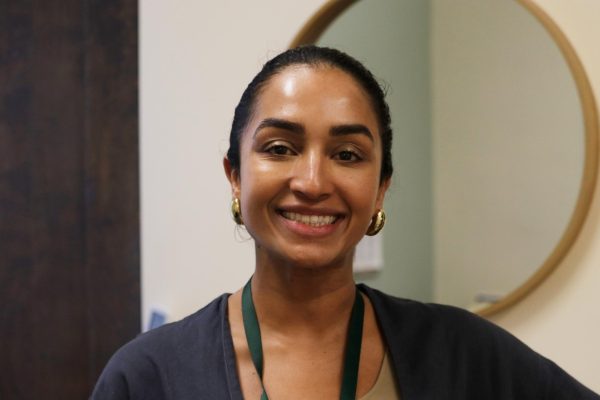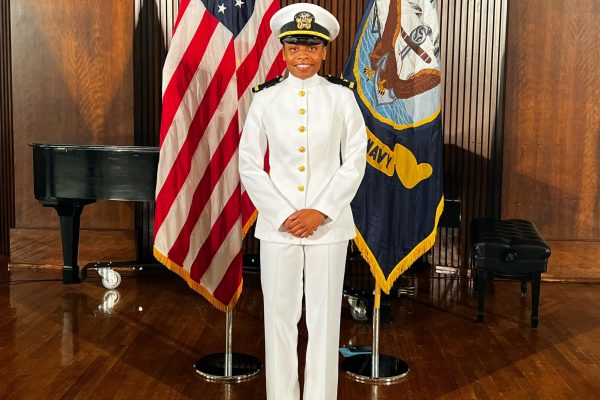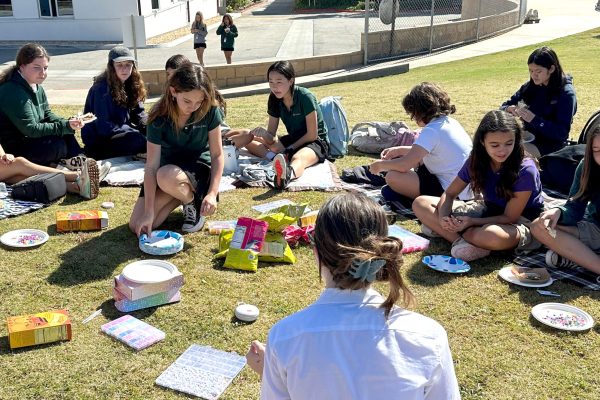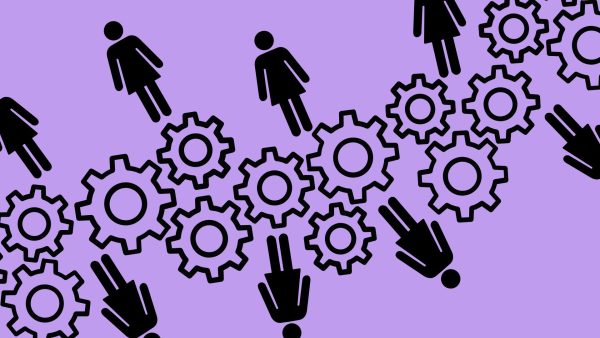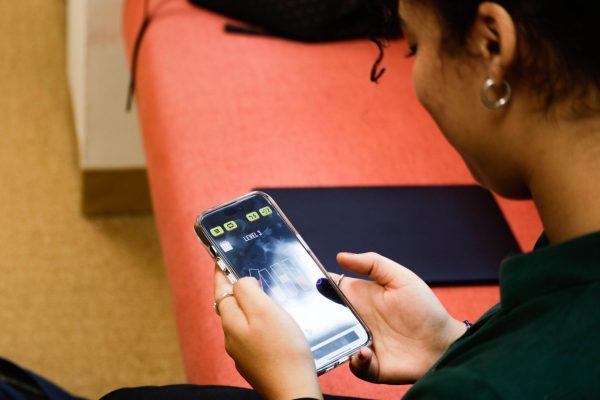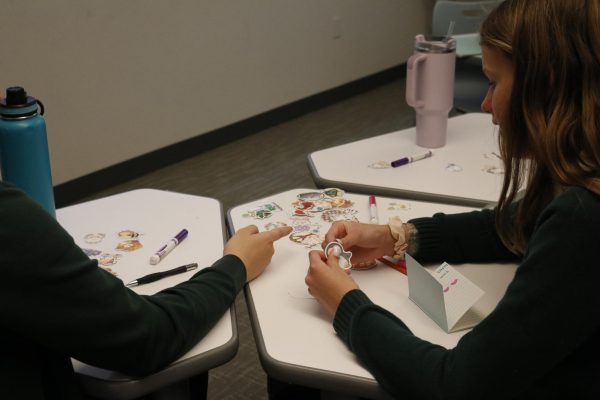Cash, Community, COVID-19: Is Archer economically impacted by the novel coronavirus?
Photo credit: Tim Dennell, Creative Commons
A liquor store in Sheffield, UK posts a sign reminding customers to social distance during the COVID-19 pandemic. Although businesses that provide essential services like food or healthcare are permitted to stay open, millions of people, including members of the Archer community, face financial uncertainty and job insecurity.
Although students switched to remote learning on Tuesday, March 17, quarantine could not protect all members of the Archer community from the spreading influence of the novel coronavirus, COVID-19. Along with a downturn in the stock market and nationwide grocery shortages, individuals, families and organizations are affected deeply by the financial impacts of the pandemic.
The current unemployment rate in the U.S. is 4.4%, and 26 million Americans are currently out of a job due to COVID-19. Many of these employees have been laid off or furloughed. The government is trying to respond to these climbing rates by distributing stimulus checks and small business loans. Nevertheless, consumers’ trust in the market faced the most rapid decline in history this month. Consumer confidence is now at 71%, the lowest point since 2011.
Although there is much tension over the economic impacts of COVID-19, many members of the Archer community feel grateful to have the support of the school. The school administration itself acknowledges that COVID-19 is having a financial impact but remains hopeful about the year to come.
Impact on Archer’s Finances
Archer’s Chief Financial Officer [CFO] Jane Davis and the business office are handling the pandemic “one day at a time.”
“We’re continuing to do business as usual,” Davis said on March 23. “We’re still able to pay bills, make the payroll; we’ve always done that. No matter what environment we’re in, we’re still in a learning environment, and we’re still delivering learning to our students, so we haven’t made any changes to our financial expectations for the year.”
In terms of the safety and security of Archer’s extended community, Davis says Archer is “doing their best” to avoid contributing to hysteria and job cuts, even for “contracted workers” like bus drivers or security staff.
“We can continue to pay the contracts with those vendors in the hopes that they will turn around and pay the employees,” Davis said. “We trust that they will, and the last thing that we want to do in this environment is contribute to what I think everyone knows is going to be a downturn in the economy.”
Math teacher Leila Chakravarty feels “grateful” to be in a salaried profession such as teaching and to be working at Archer during this time.
I’m so proud of Archer, and so proud of the students and how you guys have been able to just pivot to this normal that nobody ever thought would be the new normal. I’m proud of the Archer admin team, all of the teachers and administration and staff
— Jane Davis, Chief Financial Officer
“People that I am friends with have been laid off or they have had their hours cut really drastically, and they’re wondering, ‘How am I going to get through these next couple of weeks?’ The government recently just stepped in with a stimulus package,” Chakravarty said on March 25. “Archer has really — and I’m really grateful — has really sheltered us teachers from that because we’re salaried.”
Mirroring Chakravarty’s sentiments, English teacher Lauren Bahedry is also feeling gratitude towards how the Archer administration has handled this “scary” and “hectic” situation.
“Part of me feels grateful to be a teacher because [we’re] not fearing for our jobs, which is an amazing space to be when so many people are,” Bahedry said.
Davis assured the community that athletics and arts programs would continue to be supported financially, calling them “smaller pieces of the puzzle” in Archer’s budget. However, the business office has been considering how the new, remote format of the Archer Affair (the school’s annual fundraising gala) will affect the school’s budget for next year.
“We’re hoping [the new event] will match, or at least come close, to what our expectation was on a net basis,” Davis said. “In other words, because we won’t have the expenses of actually paying for the venue and the band and all of that, it reduces the amount of money that we have to raise.”
After the event had taken place, Head of School Elizabeth English said that the senior administrative team does not currently have an estimate of how much money was raised. This is partly because the “Raise Your Paddle” event, a substantial part of the Archer Affair, works on a pledge system, and not all pledges are actually paid out. Regardless of the total revenue, English called the event “successful.” She stressed the importance of “contribution support” or donations like those collected at the Archer Affair.
“That contribution support literally helps us balance the budget,” English said. “It helps us pay the teachers, it helps us keep the lights on, it helps us provide educational access for girls who would otherwise not be able to afford Archer.”
English said that outside contributions make up 12% of the overall budget, and Archer’s goal this year was to raise $3 million. Due to COVID-19, English is expecting a “shortfall,” but remains optimistic.
“Is it stressful? Yes,” she said. “But I’m confident that we’re going to be able to make everything balance out regardless.”
Impact on Archer Community
Although students and faculty are worried about their families’ financial situations, they are attempting to follow safe at home guidelines and remain positive.
“My dad is taking it all the hardest,” eighth-grader Shaya Mossanen said on March 13, the last day of in-person instruction. “He’s in the financial industry, and his clients are losing trust in the market. It’s making his job harder and harder every day. Over the past week, when he’s taking me to the bus, a bunch of people [have] called him about what’s going on in the world, and my dad doesn’t know really what to do. He’s trying; it’s just hard.”
Other students, such as junior Caterina Cajrati Crivelli Mesmer Nobili, noticed a change in their parents’ attitudes as well.
“It’s all we talk about at dinner,” Nobili said just over a month ago. “It’s been slightly stressful for my parents, and irritating because [it is] preventing them from doing what they enjoy doing.”
Nobili’s father, who currently owns a social club, has been losing income due to the quarantine orders as well as social distancing regulations.
“There’s not been much of an income, considering they’ve had to shut down the major social aspect of it in order to prevent the coronavirus from spreading,” Nobili said. “That’s been a stress for my family because it’s been lowering our income.”
Although both Mossanen and Nobili have been impacted by the virus, both are, as Mossanen put it, trying to remain “calm and collected.”
Nobili was born in Italy in the Northern city of Milan, which was the coronavirus’ largest hub outside China’s Hubei Province at the time Nobili was interviewed. The United States has overtaken Italy as the country with the most reported cases since Nobili’s interview on March 18. Although much of Nobili’s family “managed to get out of Milan,” some members remain in the city.
“[Milan is] a major hub for the coronavirus,” Nobili said. “It’s just been spreading like wildfire there. The streets are empty, kids can’t go to school. Kind of like us now, but it’s been going on for a while. It’s pretty scary.”
Chakravarty has two small children, and, like Nobili, has concerns about how to keep her family safe during a worldwide pandemic.
Just these moments, the Italians singing on their balconies, these are stories that you hear about. Moments where people are helping each other and coming together and remembering what’s really important in their lives.
— Lauren Bahedry, English teacher
“We would ideally like to be able to still visit with the grandparents at some point, but we’re also really worried about their age and their vulnerability,” Chakravarty said. “[We] could easily be silent carriers, and so I think we’re thinking a lot about that, knowing how lonely they are and how much they want to see [their] grandsons versus how dangerous this virus would be for them, and so trying to weigh out those pieces.”
Nobili believes “looking out for others” is the most important thing to remember while the world weathers the outbreak.
“I know people can get scared, but some people are lacking awareness of others during this time,” Nobili said. “I think it’s important that we work together as a community and that we look out for each other.”
Bahedry also acknowledged some that some individuals “choose greed,” but there is an even greater number of people being “giving and generous.”
“I think something like this can bring out the best in people,” Bahedry said. “We’re seeing people come together, and we’re seeing people try to find solutions instead of just fighting. I think our world has been really defined by separatism and fighting lately, … and I hope that this can wake people up a little bit, to remind us what matters, and that caring for one another, caring for your fellow human beings, is what should be a priority.”

Rio Hundley was involved in the Oracle from 2017-2021. She graduated in 2021. She was promoted to Sports Editor in 2019 and became Features Editor in 2020....
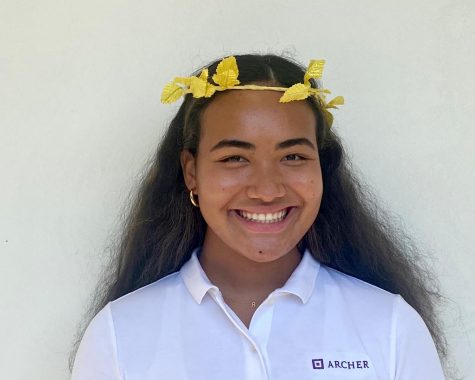
Vaughan Anoa'i joined the Oracle as a staff reporter in 2019 and became the News Editor in 2020. In 2021, she became the Editor in Chief. She loves playing...





![Freshman Milan Earl and sophomore Lucy Kaplan sit with their grandparents at Archer’s annual Grandparents and Special Friends Day Friday, March 15. The event took place over three 75-minute sessions. “[I hope my grandparents] gain an understanding about what I do, Kaplan said, because I know they ask a lot of questions and can sort of see what I do in school and what the experience is like to be here.](https://archeroracle.org/wp-content/uploads/2024/03/grandparents-day-option-2-1200x800.jpg)















































